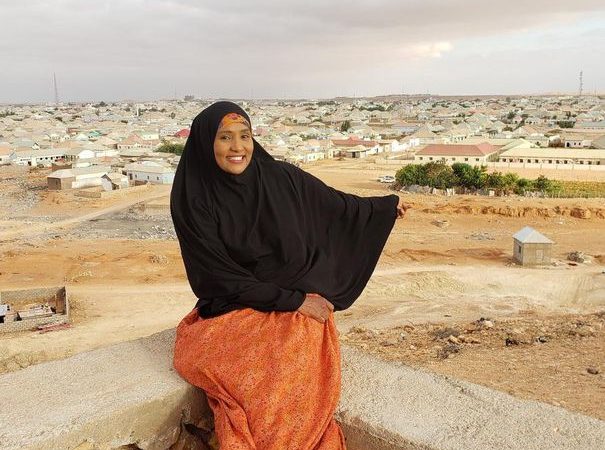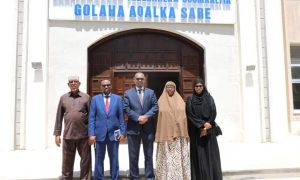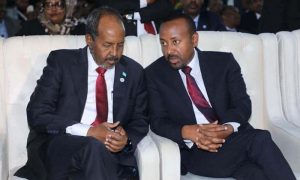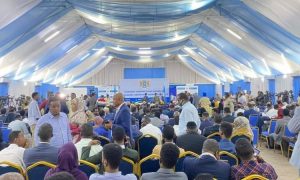____________________________________________________________________________
 |
The Star | Toronto | By Ebyan Abdigir | Opinion | July 21, 2019 – I met Hodan Nalayeh as Integration TV was getting started. I was in my first year at Ryerson’s School of Journalism, working on a class assignment that required me to interview a journalist.
I looked for a Somali woman and I couldn’t find one at the time until I came across Nalayeh. That’s because Nalayeh aligned herself uniquely with her Somali roots. Her network, Integration TV, was marketed as the first English program connecting the Somali diaspora.
As a woman, a journalist and a Somali, I am one of many impacted by Nalayeh’s legacy. Within six years, her name would be one that Somalis across the world would recognize. She interviewed politicians, businesspeople, and everyday folks across borders.
She contributed relentless community work offline, often reaching out to young Somalis across the diaspora who were embarking on their careers, offering encouragement and giving them a platform on Integration TV. Nalayeh’s was a voice that connected generations — millennials and their parents, and Somalis living in the West with their families back home.
Nalayah, 43, and her husband, Farid Jama Suleiman, were killed in Somalia on July 12 when militants stormed a hotel in Kismayo.
On Nalayeh’s last Twitter post, she used the hashtag: #NaagIskaDhig, a Somali phrase, which translates to “make yourself a woman; behave like a woman; be a woman.” It’s a phrase Somali women often say endearingly, maybe even harshly, to one another when life gets tough.
Naag Iska Dhig is about matriarchal kinship and resilience, the backbone of Somali culture. Shining a positive light on Somali culture was at the centre of Nalayeh’s work.
Halima Saad is a Toronto businesswoman, activist, and a mother of seven who met Nalayeh while she was organizing a life achievement award for the late Somali singer and activist Saado Ali Warsame. A few years after meeting for the first time, Saad would host Nalayeh in Borama, Somalia, where Saad’s family owns a hotel. Nalayeh interviewed Saad on her program that was often supported by international Somali businesses.
“Her work exposed the beauty of Somalia to the diaspora audience. Hodan was very happy that two Toronto women were having a memorable time in Somalia. I will cherish that memory forever,” Saad said.
When we had connected in 2014, Nalayeh took me under her wing. In a studio in Woodbridge, she interviewed me and asked me about my hopes and dreams. I felt torn, not entirely sure how to navigate the media landscape as a woman of colour. I was aware that journalists in Somalia were at risk. Since 1992, over 66 journalists have died violently, according to the Committee to Protect Journalists (CPJ). Nalayeh did not want to give terrorists attention. Instead, she gave us what we needed: hope.
Canadian media may break our stories, but we’re best suited to tell them. The Toronto Star’s “Somali drug dealers” 2013 controversy is one that I often think about as a journalist. It’s a point of contention for Black academics, many of whom are Somali women.
Being a Somali-Canadian journalist means grappling with the weight of language and negotiating what expressions on issues may prompt a white journalist to ask me what’s the difference between an activist and a journalist. I was haunted by these controversies while in journalism school, and I nearly decided not to continue pursuing journalism. These negative perceptions of being Somali in Canada is what Nalayeh was up against.
In her book, Policing Black Lives, Robyn Maynard writes: “the state is imagined by many to be the protector of its national subjects. But this belief is a fiction — one that can be maintained only if we ignore the enormous harms that have been directly or indirectly caused by state actions.”
At times, Canadian media may centre our stories around despair, but I see resilience, just as Nalayeh did, and I am not alone. Hodan Nalayeh created the foundation of what prioritizing positive storytelling looks like for communities tangled in negative narrative loops, and the youth today are too woke to let Nalayeh’s work go unfinished. We have the range to tell our stories in impartial ways, even if our identities may suggest otherwise to those who don’t live like we do.
.
.
Ebyan Abdigir is a journalist and producer based in Toronto.
.
.
.
Xafiiska Wararka Qaranimo Online | North America
________________________________________________________
_____________________________________________________________________________________
Xafiiska Wararka Qaranimo Online | Mogadishu, Somalia
_____________________________________________________________________________________
Advertisement
_____________________________________________________________________________________
 |
_____________________________________________________________________________________
 |
_____________________________________________________________________________________









